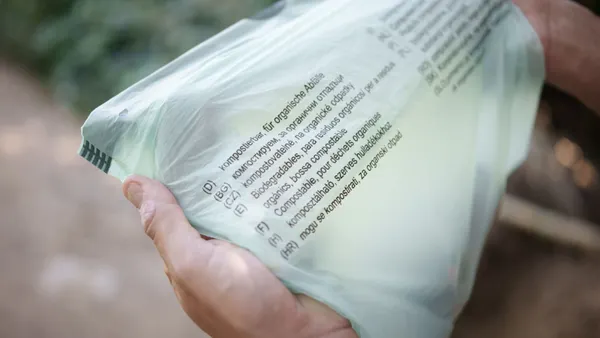Dive Brief:
- Rep. Chellie Pingree (D-ME) and Rep. David Young (R-IA) launched a House Food Waste Caucus earlier this week with plans to reduce food waste across the supply chain; educate fellow members of Congress and their staff; reduce waste at agencies such as the USDA and EPA; and "collaborate with diverse stakeholders to highlight food waste success stories."
- Both representatives cited food insecurity as a primary driver for their interest, calling the problem of food waste "staggering" and decrying "the amount of food needlessly dumped into landfills."
- On Stop Food Waste Day, April 27, Pingree also hosted a briefing on the topic with remarks from the American Biogas Council, Campbell Soup, Feeding America, Further with Food, and the Harvard Food Law and Policy Clinic (HFLPC).
Dive Insight:
Their ranks may be small for tackling such a large issue, but the formation of this group represents another step toward giving waste issues a national platform.
Though it may be related in spirit to the House Recycling Caucus, this Food Waste Caucus will likely have more in common with other caucuses representing farmers. That's because the recently drafted 2018 Farm Bill is seen as one of the best chances to get new food waste policy enacted at the national level.
Pingree's 2017 Food Recovery Act outlined many of the priorities groups are pushing for, though it hasn't seen any movement. The current Farm Bill text doesn't seem to have lived up to expectations around food waste either. It includes grants for rural waste management programs, and the creation of a "food waste liaison" at the USDA, but few other items on the wish lists of groups such as the HFLPC or Natural Resources Defense Council.
Aside from codifying the EPA's food waste recovery hierarchy, some of the most tangible results from a national policy would involve regulatory updates. This would include expanding donation liability protections under the Bill Emerson Good Samaritan Donation Act and clarifying date label language. Research has shown these types of upstream fixes could have significant implications. Recent state and local changes have helped create momentum, but like anything, that could be accelerated by a uniform national approach.
Pingree's national proposal would also open up funding opportunities for processing infrastructure, an area which some in the industry still view as financially underdeveloped, even in states with diversion mandates. Figuring out how to balance the desire to see more composting and digestion sites with the goal of reducing upstream waste in the first place is an ongoing discussion. Incorporating farmers into that can help on both fronts, which is what makes Pingree's personal farming background and Young's farming constituency an intriguing combination.











